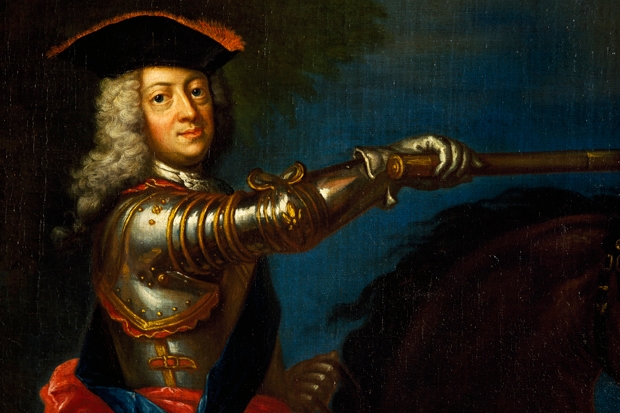The centenary of the start of the first world war is getting much more attention than the tricentenary of the accession of George I, which also falls this week. As far as I can tell, no new biographies of the first Hanoverian king are imminent, whereas books on the great war are pouring forth. You can see why. The replacement of a plump, if benign, queen by an ‘obstinate and humdrum German martinet with dull brains and coarse tastes’ (Winston Churchill’s words), who presided over a huge financial scandal and died unlamented after a short reign, need hardly detain us.
But forget the royals and focus on what we might call the reshuffle among politicians that accompanied the change. Here’s how Henry St John, 1st Viscount Bolingbroke, described the last week of July 1714 in a letter to Dean Swift: ‘The Earl of Oxford was removed on Tuesday. The Queen died on Sunday. What a world this is, and how does fortune banter us.’
The fall of the Jacobite-leaning Tories, led by Bolingbroke and his rival and former friend Oxford, with a coup d’état in the Privy Council by the Hanoverian-favouring Whigs, led by the Duke of Shrewsbury, on 30 July turned out to be a key moment in British history. It was never reversed, despite several attempts. In its own way it was as significant as 1216 and 1688.
The Tory Bolingbroke, a dazzling orator and spectacular libertine, had been stuffing positions of power with fellow Jacobites since becoming secretary of state and overshadowing his erstwhile ally the Earl of Oxford. But at an emergency privy council meeting on 30 July following the Queen’s stroke, he found himself outwitted by Shrewsbury, who unexpectedly summoned two fellow Whigs, the Dukes of Argyll and Somerset. The council got the barely conscious Queen to make Shrewsbury Lord Treasurer, then sat late into the night dispatching messages to alert garrisons and ensure that the Hanoverian succession was proclaimed.
Had Bolingbroke prevailed at that meeting, we would probably have had a King James III, though there would almost certainly have been a civil war (instead of the minor fiasco of the Fifteen). Britain might have been more absolutist, more French influenced, more Catholic-tolerant and less commercial. The stirrings of steam in the north that were to start the industrial revolution — the first faltering steps to turning heat into work — might have fizzled. The Act of Union with Scotland, agreed to some years earlier as part of the English insistence on the Hanoverian succession, might have unravelled.
At least, so goes conventional wisdom. In Churchill’s words, the outcome of that long meeting of the privy council was ‘No popery, no disputed succession, no French bayonets, no civil war’.
However, there is another possibility. When not bonking, Bolingbroke was a philosopher, a religious free thinker greatly admired by Voltaire and Alexander Pope. His speeches and writings were read with avidity by the American founding fathers, who credited Bolingbroke with the idea that liberty means being free, ‘not of the law but by the law’. He invented the concept of an official political opposition and saw it as his duty to prevent the Whigs turning into a perpetual oligarchy. He proposed free trade with France.
He was, in other words, a great deal more of an Enlightenment figure than the Whig who replaced him and, thanks to the blind support of George I and II, dominated politics for 20 years, while filling his pockets with ill-gotten gains: Robert Walpole.
Thus the cartoon version of history in which Whigs and Hanoverians brought liberty, parliament, Protestantism and trade, while Tories and Stuarts would have brought absolutism, Popery and civil war, may not be right. You cannot quite help wondering if a Bolingbroke ascendancy might have given England a more vigorous Enlightenment, too, to rival those in France and Scotland. It has always puzzled me that the stars of the Enlightenment — Voltaire, Diderot, Hume, Smith and co. — included plenty of Scots and French, but no Englishmen.
Had Bolingbroke persuaded James Edward Stuart to turn Protestant, as he had tried to, then many British people would have welcomed a Stuart king. The idea of a German-speaking monarch was not at all popular. Shrewsbury’s coup might well have failed.
As it was, it was a close-run thing. There were plenty of Protestants who favoured James. I recently found out that my ancestor, who was Tory mayor of Newcastle that year, refused to declare the accession of George despite being a staunch Protestant. A rival faction did declare it, so Richard Ridley sent his thugs to stamp it out, resulting in a Friday night riot on the Quayside (nothing much has changed).
Still, it all worked out in the end. Britain may not have loved its new king, nor the corrupt grandees who ruled in his name and promptly debauched the currency in the South Sea Bubble. But George did give sanctuary to Voltaire when he was exiled from France, and gradually the country did take advantage of the largest free-trade area in Europe (England and Scotland) to sow the seeds of prosperity and incubate freedom.
Bolingbroke’s most famous work, The Idea of a Patriot King, was written at Alexander Pope’s behest much later in 1738 to influence George I’s grandson Frederick, Prince of Wales, into being a monarch who rose above faction, was a father to his country and championed trade.
Which, if you think about it, is roughly what we have now.






Comments